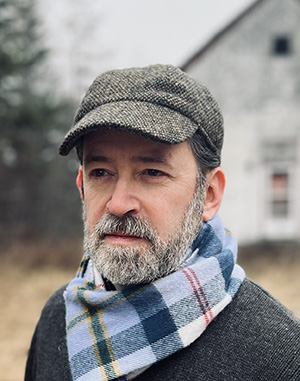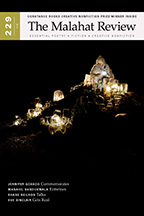Inside a Diner, Inside a Dream:
Kevin MacDonell interviews
Shane Neilson

Past contributor Kevin MacDonell talks with Shane Neilson, whose cnf piece "Chasing Goffman" appears in our winter issue #229. They discuss dissociation, the theory of translationality, and how trauma and poetry are conjoined twins.
Read an excerpt from "Chasing Goffman" here.
Shane Neilson is a poet, physician, and scholar who completed his Ph.D. in McMaster‘s English and Cultural Studies Department on the representations of pain in CanLit. Dysphoria (PQL, 2017) won the Hamilton Arts Council Literary Award for Poetry in 2018. Also in 2018 his dissertation work received SSHRC‘s $50,000 “Talent” award. His practice is located in Guelph and he currently serves as an adjunct assistant clinical professor of medicine at McMaster University’s Waterloo campus. His most recent books are Saving: A Doctor’s Struggle to Help His Children (Great Plains Publications, 2023); co-written with Roxanna Bennett, The Suspect We (Palimpsest, 2023); and an edited (with Sarah Fraser and Arundhati Dhara) collection on healthcare narratives concerning COVID-19 titled The COVID Journals (U of Alberta P, 2023). A busy year! His upcoming book, What to Feel, How to Feel: Lyric Essays on Neurodivergence & Neurofatherhood (June 2025), can be preordered here.
Despite its intense interiority, “Chasing Goffman” is memorably peopled, not least by Erving Goffman, whom the narrator knows only through biographies and Goffman’s own scholarly works. An extended “conversation” with him takes place inside a diner, inside a dream, inside the mind—all while respecting the bounds of nonfiction. I admire how the dream framing is so lightly and deftly handled. Did this form come to you naturally, or did it require exploration, perhaps through successive drafts?
For me, the structure is less oneiric and more trauma-based. I spend much of my time in a dissociative state, meaning the story fragments reflect how I myself live, how details trigger greater remembrance. How each detail is emblematic of greater experience. I spend so much time dissociated, I no longer merely remember. I imaginatively live into the pieces. I was well into adulthood before I learned most others don’t have this kind of subjectivity. You could say every bit of my life is nonlinear, poetic, I need to do work to stitch. Another great poetic strategy is repetition, so trauma and poetry are conjoined twins. They wish they could be singular and complete, but they can never be. They have to dream together.
Goffman presents an enigmatic character—his primary role is as a listener—but his silence is eloquent. What drew you to Erving Goffman and led you to build your piece around him? I’m interested in the attraction of what can’t be known, such as the thoughts and reactions of someone absent, and I can imagine how technically difficult this is in nonfiction. Did you employ any sort of “rules” about how you would present his point of view? Certain limits on speculation, guardrails for extrapolating from things he wrote or is quoted as having said?
On Stigma drew me to Goffman. The book is legendary—a text everyone should read. It begins with the etymology of stigma, which is a very great recommendation. If a scholarly book cares enough about words to be specific about its subject, to provide a history of usage over time, a reader is in the presence of a writer. Because I am an obsessive about the writers I love, I read everything by them that I can reasonably access. I always give that piece of advice whenever I run a writing workshop—fall in love with as many writers you find that deserve it, and read everything that they’ve ever done. Devotion will reward you again. As for rules, I stand in profound solidarity with Goffman. He says nothing about himself. At any point. I may be wrong about what I project about him in the story, but I am not wrong by leaving him silent. He would never have spoken to me about his pain. And I think I would have been loathe to ask him. I would have been happy enough for him to think of me as a subject, a data point.
Time is an active agent, almost a physical force, and not a benevolent one. “The governor of time is trauma,” you write, forcing past, present, and future “into a single moment.” Remembering is not something you do; it is something that happens to you. It’s involuntary. But it would seem this unwelcome imposition is also what makes memoir possible. Could you tell me a bit about the role of time in your work generally, and how your memory functions while you are writing?
This is a lovely question, a complicated one, and I can’t do it justice here. For those interested, I write about the “three-in-one” in The Things Which Are, a manuscript out to publishers on poiesis. The manuscript is influenced by Catholicism, specifically how a dissociating little boy in the pews might feel words he cannot understand. For me, time is a singularity, it does not exist chronologically. The best way I can explain is to liken the matter to synaesthesia: some hear music and see colors, for example. My sense of time is actually spatial, I have a poetic experience of time. Another future publication I can point to, Delimiting: On Poetry and Medicine, concerns a manuscript about the theory of translationality from the health humanities and Canadian poetry. A chapter of this book develops a theory of time in poetry, essentially recapitulating what we know from history to the present. Ironically, I make a chronological recounting! The short version is: poetry has time all ways, all the time.
Your narrator examines the experience and pain of stigma. There’s a hint of something else, via the plural, stigmata, with its connotations of sainthood and being set apart—painful but also special, even holy. I might be going too far with that, but it does bring me to ask whether, for you, writing has an ability to transform painful experience into, not consolation, but beauty or other value. In short: What most motivates you to write from experience? And what about it decides its direction towards either poetry or prose?
Yes, Goffman is the source here regarding stigma and stigmata. I do not consecrate pain but I transmute it as best I can, soldering time as it manifests as space, one accreting picture added to piece by ripped piece. As for making distinctions between genres, I am not sure how to answer, because there are many factors to consider. Let’s see, I’ll mention a few. First, there is purpose, which is really funny to admit, because if I want to be read and understood, then prose is the best way of course. If I want to more accurately represent how I understand the world, however, then poetry is better, and poetry is my Sweet Baboo. Which is not to say poetry should be self-indulgent, -involved, or -referential, overly. I’m talking audience, which for poetry is limited, and some pieces want to invite more people into a bigger singularity. My mind goes where it must, where the emblem blooms around the detail. Prose for me is poetic anyway, though. I bend the prose line just until it breaks. Other factors: emotion tends to push me into the singularity, for example, and the more I consciously think about a thing, the more I’m pulled out of the three-in-one and into time’s dot-to-dot, the relentless and oppressive sequence. I say “oppressive” because one can hide in fragments. Narratology loves its calipers . . . but now that I think of my own measuring-stick, my metric, I think I should remeasure. Poems start out as poems and then rebel, their line breaks saying, “Hey, draw me up.” A story wants to collapse down the page, scattering into stanzas. I guess the words themselves decide. Best to trust them.
Your aunt in this piece writes a fairytale version of the past, which seems a failure in storytelling. What is called for is honesty. What advice do you have for writers who feel drawn to tell stories based in past trauma, but understandably find honesty difficult?
V.S. Naipaul’s famous rejoinder has always been my directive in this regard. Naipaul would say “Tell the truth.” I invoke Naipaul as a kind of literary sponsor of the idea, but really I can’t help but tell what I consider the truth to be. Testimony has to hurt, and I’m compelled to bring the truth forward.
Related to trauma is the invocation of terms relating to illness, whether mental or physical. I once read an essay on craft (I can’t find it now) that decried writers’ use of psychiatric or psychological terms as shortcuts, over-relying on readers’ popular assumptions and associations. I may have been influenced by that, because when I write about myself, I hedge around terms such as “anxiety,” even “introvert,” instead of just naming what I mean. To the contrary, you skilfully employ terms (normie, autistic) as necessary elements of narrative rather than easy explanations. Through your body of work in the medical humanities (and being a practicing physician), what have you come to know about employing diagnoses in a way that complicates or transcends what a layperson might otherwise read as mere label or category? Should writers who are not medical professionals (that is, most of us), steer clear of certain terminology? Or can we learn to handle specialized knowledge properly, in a way that serves the story and the reader?
Perhaps once one ceases to have an opinion about clinical terminology, about the latinates, once one has a poetic or spiritual experience with words. Words have always been my friends, far more than people have ever been or will be. They all have merit and value. To have a special knowledge of some words, a professional one, is to be able to use them in different ways that yet retain a matrix of plausibility, of truth. Less decorative than descriptive, a bending of them without ruination or corruption. Furthermore, as someone who pushes against stigma as a writing practice, I revel in all the words that describe a characteristic or a group of characteristics. I can subvert words that are behaving badly in the culture, but mostly I want to subvert the culture itself with the words the culture finds pejorative. An individual’s relationship with a kind of discourse says a lot about the individual, less about the discourse.

Kevin MacDonell









